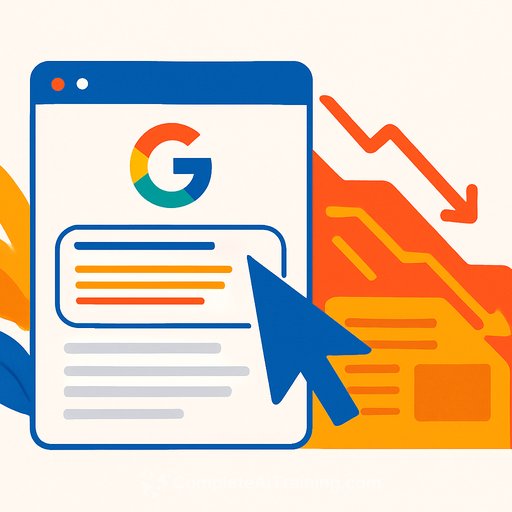Google AI Overviews Trigger Significant Drop in Publisher Referral Traffic
Recent data reveals a concerning trend for publishers: Google’s AI Overviews feature is linked to a 25% decline in referral traffic from Google Search. Despite Google's assurances that AI Overviews won't severely impact publishers, new figures from Digital Content Next (DCN) suggest otherwise.
DCN surveyed 19 member companies—including major news and entertainment brands—between May and June 2025. The results showed a broad decline in organic search referral traffic. Most sites reported traffic losses ranging from 1% to 25%, with the median year-over-year decline at 10%. Non-news brands faced even steeper drops, averaging a 14% decline.
Google’s AI Overviews and the Zero-Click Shift
The trend points to a growing shift toward zero-click search results, where AI-generated summaries reduce the need for users to click through to original publisher sites. A recent Pew survey of 900 U.S. consumers reinforces this shift, revealing that AI summaries are leading to fewer user clicks.
In the UK, the Professional Publishers Association (PPA) has submitted evidence to the Competition and Markets Authority (CMA), highlighting how Google's AI features are hurting publishers. The PPA notes Google's dominant 93% share of the UK search market and warns that AI Overviews and Google's AI Mode launch are changing user behavior away from direct site visits.
The impact extends to Google Discover, where AI-generated content citations replace direct clicks. Many publishers report 10% to 25% year-over-year declines in click-through rates (CTR) despite stable search rankings. For example, one lifestyle publisher saw CTR drop from 5.1% to 0.6% on a popular query, while an automotive publisher experienced a 25% traffic decline despite a 7% increase in search visibility.
Legal Remedies Offer a Glimmer of Hope
Amid these challenges, there is potential relief from the U.S. Department of Justice (DoJ) antitrust case against Google. A proposed remedy involves separating Google’s AI crawler from its traditional search crawler. Currently, publishers cannot block the AI crawler without disappearing from search results entirely, leaving them with little control.
If the court orders this separation, publishers could gain the ability to opt out of AI crawling while maintaining search visibility. This would be a major shift, potentially stemming the current traffic losses. The judge’s decision could come quickly if irreparable harm is demonstrated, which publishers argue is already occurring.
European publishers are also urging swift regulatory action, citing similar concerns about AI Overviews and the inability to opt out without losing search rankings.
Strategies for Publishers to Adapt
Publishers have long adapted to Google's updates by focusing on quality journalism and SEO. Experts advise maintaining core SEO strategies rather than overhauling them in response to AI-driven changes. One key insight is that AI platforms like ChatGPT rely on existing search indexes through Retrieval-Augmented Generation (RAG). If a publisher isn’t indexed, it won’t be cited by AI, leading to missed opportunities.
Branding is becoming more crucial than ever. Historically, ranking high on Google conferred automatic trust, even for lesser-known publishers. Now, AI summaries often present content without clear brand signals, making it harder to earn user clicks. Strong brand recognition and user trust must complement editorial quality to maintain engagement.
For smaller or lesser-known publishers, investing in branding and technology is vital. One media group recently shifted resources toward these areas to better compete on AI-driven platforms.
Key Takeaways for PR and Communications Professionals
- Expect a continued decline in referral traffic from Google Search due to AI Overviews and zero-click search results.
- Monitor legal developments closely, as regulatory interventions may change the landscape for publishers.
- Focus on maintaining strong SEO fundamentals—being indexed remains critical to visibility on AI platforms.
- Invest in brand building to strengthen trust and encourage clicks beyond AI-generated summaries.
- Stay informed on AI trends affecting search behavior to adjust communications strategies accordingly.
For professionals looking to deepen their understanding of AI’s impact on digital content and search, exploring specialized courses can be valuable. Resources like Complete AI Training offer up-to-date courses that cover AI tools and strategies relevant to communications and publishing.
Your membership also unlocks:






